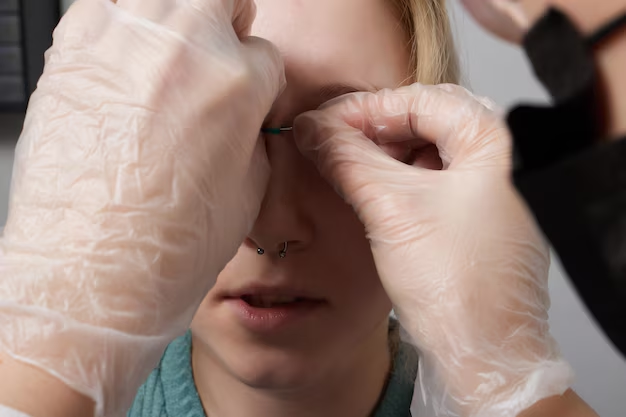Your Guide to How Long After Cataract Surgery Is Vision Blurry
What You Get:
Free Guide
Free, helpful information about Cataract FAQ and related How Long After Cataract Surgery Is Vision Blurry topics.
Helpful Information
Get clear and easy-to-understand details about How Long After Cataract Surgery Is Vision Blurry topics and resources.
Personalized Offers
Answer a few optional questions to receive offers or information related to Cataract FAQ. The survey is optional and not required to access your free guide.
How Long Will Your Vision Be Blurry After Cataract Surgery?
Cataract surgery is a common, life-changing procedure that can restore vision and renew independence. However, patients often wonder, "How long will my vision be blurry after the surgery?" This question is not just about managing expectations but also about understanding the healing process involved. In this guide, we'll break down the normal recovery timeline, factors that may affect vision clarity, and what you can do to aid in your recovery.
What to Expect Immediately After Cataract Surgery
Cataract surgery is typically an outpatient procedure, taking about 15 to 30 minutes to complete. Even though it’s brief, the effects on your vision will not be instantaneous.
First Few Hours Post-Surgery
Immediately following surgery, it's completely normal to experience blurry vision. This initial blur is due to several factors:
- Eye drops and medications used during the procedure that affect pupil size and focus.
- Protective shields placed over the eye to safeguard it from dust and germs.
First 24 Hours
During the first 24 hours after surgery, your eye is beginning to process the changes made. Here’s what typically happens:
- Blurriness may continue as the eye heals and adjusts.
- Sensation of grittiness or irritation might be felt, which can make it harder to keep the eye open.
Importance of Following Post-Op Instructions
It’s crucial to follow all post-op instructions given by your healthcare provider, such as:
- Avoid touching or rubbing your eyes.
- Use prescribed eye drops to prevent infection and reduce inflammation.
- Wear protective shields while sleeping for the first few days.
The First Week: Adjusting to Changes
During the first week, your vision should gradually start to improve. However, it is still common to experience some degree of blurriness and other symptoms.
Blurry Vision and Other Symptoms
Often, patients report:
- Mild blurriness or cloudiness as the eye adjusts.
- Light sensitivity due to pupil dilation issues.
- Halos or brightness around lights at night, which could make driving difficult.
Managing Symptoms
Maintain your surgical aftercare as directed:
- Keep using prescribed eye drops.
- Avoid strenuous activities or heavy lifting.
- Test your vision improvements in well-lit conditions.
Vision Quality: A Timeline
Understanding the typical recovery timeline can help alleviate concerns and plan activities around your vision's progress.
First Month
Within the first month, most significant blurriness should resolve, and vision clarity improves notably. Here’s a rough timeline:
- Week 2: Many patients notice a marked decrease in blurriness.
- Week 3 to 4: Vision often approaches the intended final quality.
Factors Affecting Recovery
Individual recovery can vary based on:
- Overall eye health before surgery.
- Compliance with post-op care and use of eye medications.
- Age and underlying health conditions that may slow healing.
Longer-Term Adjustments and Concerns
While most patients enjoy clear, stable vision rather quickly, some may experience longer healing times or need additional attention.
Potential Extended Blurry Vision
Extended blurry vision might happen due to:
- Secondary cataracts—known as posterior capsule opacification—can cloud vision and may require additional treatment.
- Underlying health conditions, such as diabetes, affecting eye health.
When to Consult Your Surgeon
Reach out to your eye care provider if:
- Blurriness persists beyond a month.
- You experience pain, persistent redness, or sudden vision loss.
- You have concerns about your healing or medication side effects.
Tips for Optimizing Recovery 🚀
To aid in a smooth recovery and ensure the best possible vision outcome, consider these practical steps:
📅 Stay Consistent with Appointments: Attend all scheduled post-op visits for professional monitoring of your progress.
🕶️ Protect Your Eyes from Bright Lights: Use sunglasses outdoors to minimize discomfort from glare and light sensitivity.
💧 Be Diligent with Eye Drops: Proper application of prescribed drops can prevent complications and support optimal healing.
🚴♂️ Avoid Strenuous Activities: Refrain from heavy exercise or lifting, as these can increase eye pressure and slow recovery.
🛌 Prioritize Rest and Hydration: Adequate sleep and hydration support overall healing processes in the body, including your eyes.
Understanding and Embracing the Change
Cataract surgery is a pivotal moment for many who struggle with impaired vision. While the journey to clear vision start may seem long, patience and adherence to aftercare can guide you toward successful recovery. If all goes as expected, not only will your vision clarity return, but it can also surpass what you’ve experienced in years.
By acknowledging the normal recovery benchmarks and understanding when and why to seek further advice, you empower yourself to handle the post-surgery period with confidence. Whether you experience a swift return to visual clarity or need minor adjustments along the way, maintaining open communication with your healthcare provider is essential. Remember, everyone’s path to clear vision varies, and what works for you might not apply to another; personalization of care is crucial.
May your visual future be bright and blur-free! 👀✨
What You Get:
Free Cataract FAQ Guide
Free, helpful information about How Long After Cataract Surgery Is Vision Blurry and related resources.

Helpful Information
Get clear, easy-to-understand details about How Long After Cataract Surgery Is Vision Blurry topics.

Optional Personalized Offers
Answer a few optional questions to see offers or information related to Cataract FAQ. Participation is not required to get your free guide.


